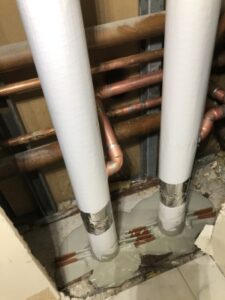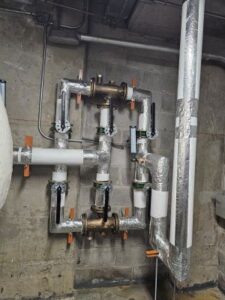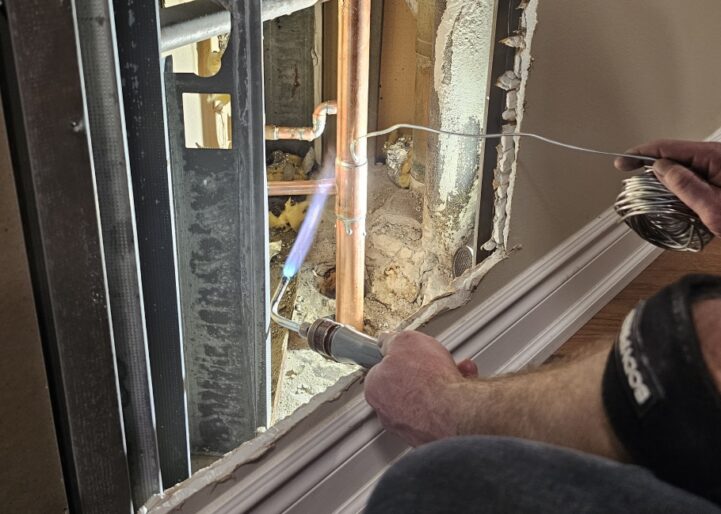The second wave of plumbing failure has arrived. First it was Kitec, which caused chaos and floods in buildings due to the use of two dissimilar metals in the plumbing system. And now there’s another system raising eyebrows, and budget expenditures.
Although on a smaller scale, the newest pandemic in plumbing failure is epoxy-lined plumbing pipes. Around 2010, building owners began relining rather than replacing their piping to save costs. Now, the epoxy linings are failing, causing major blockages in the water and heating systems. A temporary repair to unblock the lines can cost tens of thousands of dollars, and even though fan coil units and heat pumps are often the responsibility of the individual unit owner, buildings with epoxy-lined heating or air conditioning risers are discovering that since the deficiency lies outside of the unit boundary, the corporation could be responsible for the repair or replacement of the fan coil or heat pump.
“We are finding in some of the newer buildings with epoxy piping that the risers are failing prematurely and causing leaks, some of them catastrophic,” says Mark Cohen, founder of Jermark Plumbing and Mechanical, a company which specializes in high-rise properties. “And we’re finding a lot of older buildings with copper piping are also starting to fail.”
According to Cohen, the industry is currently incredibly busy due to work previously delayed during Covid. “The industry is still trying to catch up, and the cost to repair water damage is escalating,” he says.

Insulation and fire stop installed.
How to Choose a Repiping Company
While the process of repiping is invasive for residents, the work is a lot less intrusive and damaging than the possibilities resulting from a flood. Residents will feel more comfortable if they have confidence with the contractors doing the job, and for those receiving and reviewing quotes, that means spending time qualifying the right companies for the job and not jumping at the cheapest pricing.
“I always recommend an engineer be hired and consulted to investigate,” comments Cohen. When the work goes to tender, he urges a Board of Directors to consider the following:
- Length of Time in Business: Many new companies try to enter this market and fail, he says, suggesting the company chosen should have experience repiping buildings for “at least 15 years, if not longer.”
- Master Plumber’s License: Does the principal of the company hold their Master Plumber’s license or are they renting one from someone that may not be working daily for the company? A Master Plumber’s license is needed to get a business license with the City of Toronto. “Some companies reside outside of Toronto as a way to sidestep the credentials,” Cohen warns.
- Ontario College of Trades membership: Insist on having a copy of each plumber’s Ontario College of Trades membership number, and verify they are working for the company you are using.
- No Sub-Contracting: Ensure the company does not subcontract the plumbing portion of the project. Make sure this is stated in the tender documents directly.
- Make the “A” list: Newer companies with less experience may have challenges completing large projects on time. Ask the “A-listers” to tender the project.
- Ten Year Warranty: Request a 10-year warranty on the piping in the tender documents.
Despite the known issues with some times of piping, a few buildings have held out and not yet replaced the piping due to the cost and being underfunded. According to Cohen, this is now creating an issue with insurance companies. “Some buildings are being told that coverage for flood is not offered, or the cost of their deductible is increasing to hundreds of thousands of dollars.”
If you’re starting to see four or five leaks in a one-month period, Cohen recommends consulting with an engineer to determine the severity of the problem: “Even if your Reserve Fund says you don’t need to repipe your building for another twenty years—if you’re getting leaks—you need to deal with it.”

Low Zone Duel mixing valves installed and running as per engineering specifications.
Understandably, a Board of Directors may feel nervous about announcing such a big project. Not only is it expensive (does this mean a special assessment?), but it also means contractors coming into private residences to complete considerably noisy and dusty work and making some people uncomfortable. During Jermark piping contracts, a representative will meet with residents to explain what’s going on. “This helps them understand the work and feel better about the project,” Cohen explains.
In a high-rise, plumbing failures don’t go unnoticed. If you have concerns or questions, Mark invites you to email him directly at mcohen@jermark.ca. If there’s an emergency, use dispatch@jermark.ca. For general information, please contact 416-789-7611 during offfice hours.
Mark Cohen is the founder of Jermark Plumbing. Established in 1982 in the city of Toronto, the company specializes in repiping and plumbing for the high-rise industry. Cohen is the principal of the company and holds his Master Plumber’s License. Learn more at www.jermark.ca.
WATCH: “How Re-piping Saves Major Dollars in Repairs” Industry Insights interview with Mark Cohen.








